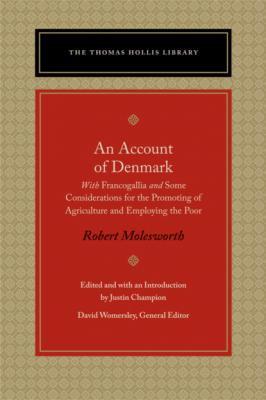An Account of Denmark. Robert Molesworth
Читать онлайн.| Название | An Account of Denmark |
|---|---|
| Автор произведения | Robert Molesworth |
| Жанр | Социальная психология |
| Серия | Thomas Hollis Library |
| Издательство | Социальная психология |
| Год выпуска | 0 |
| isbn | 9781614872504 |
Bond, William Henry. Thomas Hollis of Lincoln’s Inn: A Whig and His Books. Sandars Lectures in Bibliography. Cambridge: Cambridge University Press, 1990.
Brown, Michael. “Francis Hutcheson and the Molesworth Connection.” Eighteenth-century Ireland: Iris an dá chultúr 14 (1999): 62–76.
Champion, Justin. Republican Learning: John Toland and the Crisis of Christian Culture, 1696–1722. Manchester: Manchester University Press, 2003.
———. “Enlightened Erudition and the Politics of Reading in John Toland’s Circle.” Historical Journal 49 (2006): 111–41.
Ellis, Harold A. “Genealogy, History, and Aristocratic Reaction in Early 18th Century France: The Case of Henri de Boulainvilliers.” Journal of Modern History 58 (1986): 414–51.
———. Boulainvilliers and the French Monarchy: Aristocratic Politics in Early Eighteenth-Century France. Ithaca: Cornell University Press, 1988.
Goldie, Mark. “The Revolution of 1689 and the Structure of Political Argument: An Essay and an Annotated Bibliography of Pamphlets on the Allegiance Controversy.” Bulletin of Research in the Humanities 83 (1980): 473–564.
———. “The Roots of True Whiggism 1688–94.” History of Political Thought 1 (1980): 195–236.
———. “The English System of Liberty.” In The Cambridge History of Eighteenth-Century Political Thought, edited by Mark Goldie and Robert Wokler, 40–78. The Cambridge History of Political Thought series. Cambridge: Cambridge University Press, 2006.
Hayton, D. W. “The Personal and Political Contexts of Robert Molesworth’s Account of Denmark.” In Northern Antiquities and National Identities: Perceptions of Denmark and the North in the Eighteenth Century, edited by K. Haakonssen and H. Horstboll, 41–67 (text) and 311–16 (notes). [Copenhagen]: The Royal Danish Academy of Sciences and Letters, 2008.
Hotman, François. Francogallia. Edited by Ralph E. Giesey. Translated by J. M. H. Salmon. Cambridge: Cambridge University Press, 1972.
Kelley, Donald R. François Hotman: A Revolutionary’s Ordeal. Princeton: Princeton University Press, 1973.
Kenyon, J. P. Revolution Principles: The Politics of Party, 1689–1720. Cambridge: Cambridge University Press, 1977.
Kidd, C. “Northern Antiquity: The Ethnology of Liberty in Eighteenth Century Europe.” In Northern Antiquities and National Identities: Perceptions of Denmark and the North in the Eighteenth Century, edited by K. Haakonssen and H. Horstboll, 19–40 (text) and 307–11 (notes). [Copenhagen]: The Royal Danish Academy of Sciences and Letters, 2008.
Klaits, Joseph. Absolute Monarchy and Public Opinion: Printed Propaganda Under Louis XIV. Princeton: Princeton University Press, 1976.
Marshall, Peter. “Thomas Hollis (1720–74): The Bibliophile as Libertarian.” Bulletin of the John Rylands University Library of Manchester 66 (1984): 246–63.
O’Kane, Finola. Landscape Design in Eighteenth Century Ireland. Cork: Cork University Press, 2005.
Olden-Jorgensen, S. “Robert Molesworth’s Account of Denmark: A Political Scandal and Its Literary Aftermath.” In Northern Antiquities and National Identities: Perceptions of Denmark and the North in the Eighteenth Century, edited by K. Haakonssen and H. Horstboll, 68–87. [Copenhagen]: The Royal Danish Academy of Sciences and Letters, 2008.
Patterson, Annabel. Early Modern Liberalism. Cambridge: Cambridge University Press, 1997.
———. Nobody’s Perfect: A New Whig Interpretation of History. New Haven: Yale University Press, 2002.
Pocock, J. G. A. The Ancient Constitution and the Feudal Law: A Study of English Historical Thought in the Seventeenth Century. Cambridge: Cambridge University Press, 1957. Reissued 1987.
———. Virtue, Commerce and History: Essays on Political Thought and History, Chiefly in the Eighteenth Century. Cambridge: Cambridge University Press, 1985.
Pocock, J. G. A., ed. The Varieties of British Political Thought, 1500–1800. With the assistance of Gordon J. Schochet and Lois G. Schwoerer. Cambridge: Cambridge University Press, 1993.
Robbins, Caroline. “Library of Liberty: Assembled for Harvard College by Thomas Hollis of Lincoln’s Inn.” Harvard Library Bulletin 5 (1951): 5–23, 181–96.
———. The Eighteenth-Century Commonwealthman: Studies in the Transmission, Development and Circumstance of English Liberal Thought from the Restoration of Charles II Until the War with the Thirteen Colonies. Cambridge, Mass., and London: Harvard University Press, 1959. Reprint, Indianapolis: Liberty Fund, 2004.
———. “The Strenuous Whig, Thomas Hollis of Lincoln’s Inn.” William and Mary Quarterly 7 (1950): 406–53.
———. “Thomas Brand Hollis, 1719–1804, English Admirer of Franklin and Intimate of John Adams.” Proceedings of the American Philosophical Society 97 (1953): 239–47.
Rudolph, Julia. Revolution by Degrees: James Tyrrell and Whig Political Thought in the Late Seventeenth Century. Basingstoke: Palgrave Macmillan, 2002.
Salmon, J. H. M. The French Religious Wars in English Political Thought. Oxford: Clarendon Press, 1959.
Scott, Jonathan. Commonwealth Principles: Republican Writing of the English Revolution. Cambridge: Cambridge University Press, 2004.
Stewart, M. A. “John Smith and the Molesworth Circle.” Eighteenth-Century Ireland: Iris an dá chultúr 2 (1987): 89–102.
Worden, Blair. “Republicanism and the Restoration, 1660–1683.” In Republicanism, Liberty, and Commercial Society, 1649–1776, edited by David Wootton, 139–93. Stanford: Stanford University Press, 1994.
———. “The Revolution of 1688–1689 and the English Republican Tradition.” In The Anglo-Dutch Moment: Essays on the Glorious Revolution and Its World Impact, edited by Jonathan Israel, 241–77. Cambridge: Cambridge University Press, 1991.
———. Roundhead Reputations: The English Civil War and the Passions of Posterity. London: Penguin, 2002.
———. “Whig History and Puritan Politics: The Memoirs of Edmund Ludlow Revisited.” Historical Research 75 (2002): 209–37.
I am very grateful to David Hayton, Blair Worden, and David Womersley for their direct help and advice in the preparation of this edition, both for pointing me toward items I certainly would have missed and for general and specific comment. I am also exceptionally grateful to Rachel Hammersley, who very generously allowed me to read a draft of her important monograph The English Republican Tradition and Eighteenth-Century France (Manchester
